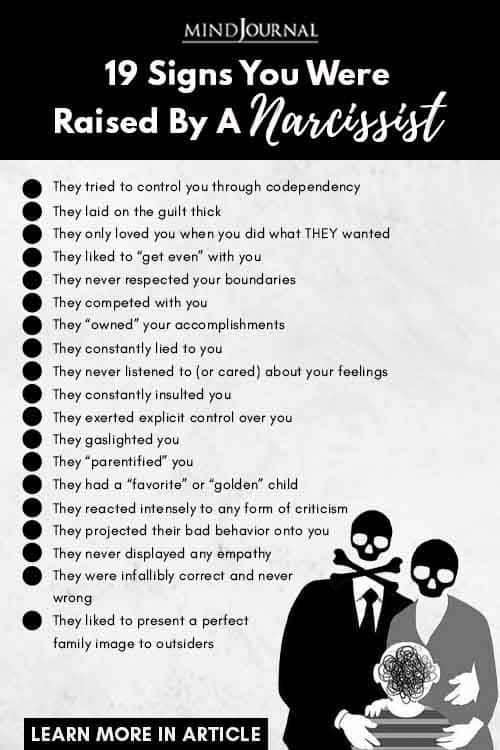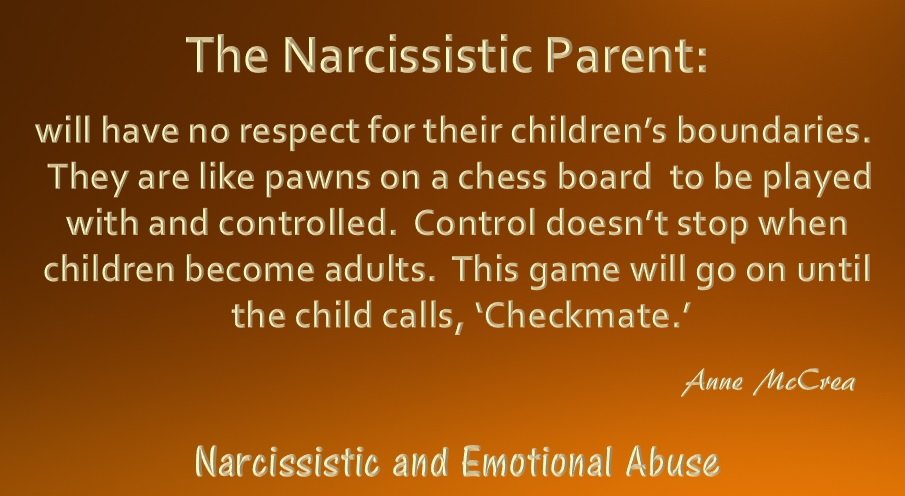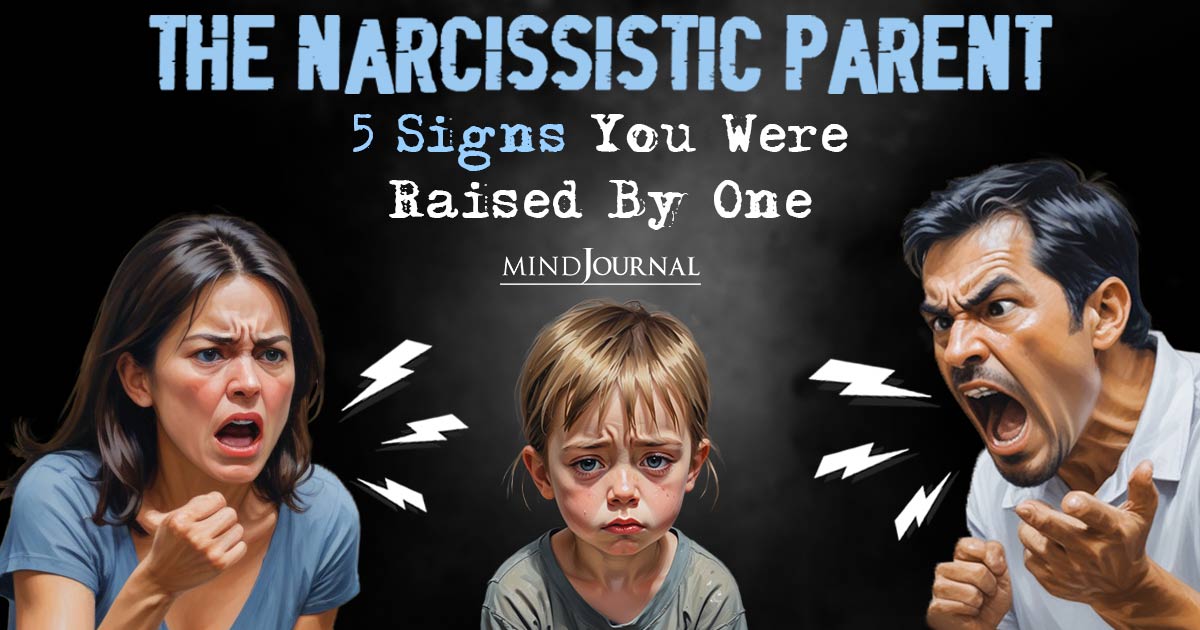Do you ever wonder if your parents’ behavior is to blame for your current relationship or emotional issues? Get to know more about being a child of the narcissistic parent and recognize the signs of a narcissistic parent.
A narcissistic parent behaves as they imagine themselves to be—the king or queen of the family, or someone whose activities are more important than being part of the family.
As a child, your parents are your world until you’re able to leave home. Your survival and self-concept depend on them. A narcissistic parent can severely damage your self-esteem, which to develop requires love and acceptance from both parents.
Children of narcissistic parents typically grow up codependent and insecure. They struggle with shame and low self-esteem.

Their adult relationships are distorted by their early childhood experiences with narcissistic parents. Although the traits of narcissism are the same, their expression by a mother or father may impact male and female children in unique ways(1).
Here’s why their parenting is toxic.
The Narcissistic Parent: 5 Signs
1. Lack of Empathy
Because narcissists lack empathy, they’re unable to nurture, mirror, and understand their children, which are necessary for developing a healthy self-concept and self-love. Even a narcissistic mother who holds and cares for her baby isn’t able to accurately empathize with and respond to her infant’s cues and emotions, limiting normal child development.
Some narcissists outsource parenting and are neglectful to varying degrees, while others might be controlling and abusive. As adults, these children neglect their emotional needs and can’t nurture themselves.
Related: 9 Things You Can Do To Help Someone Healing From Narcissistic Abuse
2. Selfish Control—It’s All About Them
Mature parents sacrifice their individual needs and wants for the good of the child and to meet their child’s essential needs.
In contrast, narcissistic parents put their feelings and needs, particularly emotional needs, ahead of those of their children, who generally adapt, become codependent, and gradually deny their needs and feelings to deal with those of the parent.
They personalize their child’s failures and natural impulses toward autonomy and either ignore their child or become more overbearing. Their child’s independence is considered a threat that can compete with and encroach on them.
Watching her 20-month-old grandchild explore her living room, my narcissistic mother remarked, “He thinks he owns the place!”
A negligent, controlling, or mixed parenting style is emotionally abandoning. This is to be expected because, like all narcissists, these parents don’t see their children as separate human beings.
The child’s needs, wants, and emotions become inconveniences, personal affronts, or burdens, like the father who coldly told his young son that he had no value because he had no net worth.
Many such parents behave like children, reversing roles and confiding in their children inappropriately about the other parent (especially after a divorce), about sexual experiences, or personal sorrows and distress.
Don’t expect narcissistic parents to be involved with their children’s hobbies, goals, or interests unless it’s also their goal or interest. They won’t take pleasure in their children’s accomplishments or attractiveness except to the extent that it reflects well upon them.
Similarly, they don’t share in their children’s excitement or pride in something unless it was their idea or of interest to them.
They will likely insist that their children dress, think, and behave according to their wishes. This extends to the choice of school, spouse, and career. They sometimes force their aspirations on their children, hoping to live vicariously through them.
Children of narcissists may be driven to prove themselves to win their teachers’, employers’, and partners’ approval or find little motivation to pursue their wants and goals when not externally supported.
These parents sometimes expect their children to listen to their rants and rages; meet their social, sexual, or financial needs; or clean the house or yard immaculately while they relax.
One cruel father demanded that his son dig a swimming pool, while another ordered his son to cut the grass with a razor blade or face physical abuse. Some narcissistic parents threaten to physically harm their children or cut them off emotionally and/or financially if they fail to measure up to their parents’ desires and expectations.
As adults, they’re afraid of making waves or mistakes and being authentic, and they learn to subjugate their needs and feelings to others.
3. Competition, Envy, and Jealousy
Narcissistic parents envy and compete with their children’s attractiveness, athletic or intellectual abilities, and other sorts of favorable attention that their children attract.
For example, they may flirt with their children’s romantic partners; they often envy their children’s connection with the other parent and may interfere with that relationship; narcissistic parents may even envy the advantages they provide to their children that they didn’t have growing up and sometimes follow up with accusations of ingratitude.
Narcissistic parents make negative comparisons to put their children down. They might compare a child to a sibling, friend, cousin, or even themselves—going on about how spoiled, inferior, or lucky their child is compared to them when they were young.
Such behavior stems from the same jealousy and envy that motivates competition. Sadly, many children of narcissists struggle for years, decades, or a lifetime with shame and low self-worth.
Related: 5 Early Warning Signs You’re With a Narcissist
4. You’re Never Good Enough
Like all narcissists, narcissistic parents are prone to brag about themselves, their achievements, their family, and their children. No one is equal to them or good enough for them.
Arrogantly, they judge and expect excellence of their spouses and children. Although narcissistic parents may sometimes appear attentive and caring, their behavior can easily switch to controlling and shaming.
Their children try to win their acceptance, but their love is only conditional, and the conditions are always changing. Trying to please any narcissist is a fruitless endeavor, but children blame themselves when they’re unable to satisfy a narcissistic parent.
Growing up according to “should’s” further alienates them from their true self and leaves them feeling sad and hopeless.

My mother always lamented that my brother hadn’t studied law, claiming that he would have been an excellent lawyer. Obtaining that praise is undoubtedly why I chose law, but that would prove elusive.
When I became an entertainment lawyer, she complained that I wasn’t a Hollywood agent, presumably because it would be more glamorous. When that didn’t happen, she urged me to be a judge, which would have had higher status.
When I decided to become a psychotherapist, she tried to dissuade me, arguing that I’d make more money practicing law.
5. Abuse and Manipulation
Children are suggestible and manipulable, and narcissistic parents easily control their children with guilt, threats, and belittling. They shame their children, as they do their partners, with name-calling, criticism, undermining, blame, and withholding love.
Frequently, they project onto their children their feelings of unworthiness and negative traits, such as attention-seeking or selfishness; characteristics which they disown.
They ignore, deny, and criticize their children’s feelings and needs, sometimes punishing a child for expressing normal emotions, claiming he or she is too sensitive or weak.
Parents often use or withhold love and acceptance to reward and punish their children, creating constant insecurity and teaching them that love is conditional. Such abuse damages any child’s sense of self and self-esteem and can be as traumatizing as physical and sexual abuse.
Healing the Wound

The lack of unconditional love, acceptance, and emotional connection in childhood can leave you with a void and unfulfilled yearning. Often adult children of narcissistic parents become depressed, have unacknowledged anger, and feelings of emptiness.
Lack of emotional support for their feelings, needs, and desires creates a pervasive feeling of deprivation. This is emotional abandonment when you feel undesired, left behind, insecure, or discarded by a trusted loved one.
To varying degrees, it can rob you of motivation and the ability to express your rights and feelings, fulfill your own needs and wants, and set boundaries, further limiting your development and self-esteem.
Until you accept your parents’ limitations and begin to love yourself, you will never be free of suffering.
Related: I Hate My Parents: How To Cope When You Feel This Way
You relive the emotional abandonment of your childhood and seek validation, self-worth, and lovability in relationships with abusive and/or emotionally unavailable partners, including addicts and narcissists.
You may unconsciously make things worse by automatically reacting like a child to an abusive or controlling parent. You easily accept blame and find fault with yourself because conditional love is all you’ve ever known.
This futile journey can lead to lifelong misery because external validation never heals internal shame and emptiness.
Recovery entails overcoming codependency and shame acquired in childhood to feel entitled to love and appreciation. When you heal, you come into proper soul alignment with your true self and destiny.
Begin to Raise Your Self-Esteem and learn to Deal with a Narcissist. See Conquering Shame and Codependency: 8 Steps to Freeing the True You to assess your symptoms and begin recovery.
© Darlene Lancer 2022
References:
See my blogs, Sons of Narcissistic Mothers and Fathers and Daughters of Narcissistic Mothers.
We hope you now know how toxic parenting can damage a child’s life and were able to identify the signs of a narcissistic parent. Let us know what you think in the comments section below.
Written by Darlene Lancer
Originally Appeared On What Is Codependency
Frequently Asked Questions
Is it normal to have a bad relationship with your mom?
If the mother is abusive, neglectful, or toxic to her children in any way, then it is not unnatural for the child to bear resentment or grudges towards the mother.
Is it bad to let your parents get involved in your relationship?
Parents and especially parents of teenagers should be aware of their children’s dating decisions and intervene if required.
How do you prove to your loved ones that you were the victim of a toxic relationship?
Abuse among intimate partners, especially narcissism is difficult to prove in the short run. If you need support, you can seek therapy or find a peer support group.










Leave a Reply